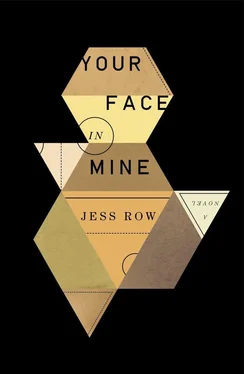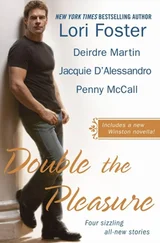Nothing, Tamika says, her eyes round, lips making a little o . I just thought he had a little girl. I could tell.
You could tell?
I guessed.
Don’t guess, Martin says. Never assume. You hear me? Ask , little girl. Learn how to ask .
Excuse me, I say, and float away from the table, not entirely sure of my legs, overstuffed and cramping. The thing about grief is that it ambushes you; you never know when the great pleasures of life — a glass of wine, buttered popcorn at a movie theater, driving the Pacific Coast Highway with the windows open, whatever — will turn sour and hollow, and so you stop trusting pleasure itself, and become wary, overcautious, self-protective. Then that caution, too, falls away; you forget, and learn to enjoy yourself again, inordinately, but you are still vulnerable. That’s as far as I’ve gotten. Still vulnerable. I wander down a hall and find the guest bathroom, exactly as I imagined it would be, lights on, fresh towels, a cardamom-scented candle, a glass bowl of flat river stones next to the sink. All of it has nothing to do with Martin, and everything, these benign surfaces, this domestic anonymity, colored only by Robin’s deft touch. Martin, I want to say, you are a sick genius, or as we used to put it in high school, a genius of crack. Where did that phrase come from? Some song, some band’s callow humor. Why was it funny? Why is anything funny?
I sit on the toilet, waiting for something to happen; it felt for a moment like diarrhea, or nausea. Nothing. With one sleeve I wipe the tepid coating of sweat off my forehead, stand, zip, and inspect myself in the mirror. The same face, slightly flushed, slightly puffy, a little more obviously graying at the temples than I remember. In the months after the accident I lost fifteen pounds, more or less all my disposable weight, and went around padded in sweaters and wool hats; since then, I’ve gained most of it back. I am, more or less, the same person I was three years ago, or twenty years ago. After all, Martin recognized me . That, in itself, is astonishing.
A year after the accident, I asked my therapist, Dr. Silverstein, if he thought it was odd that while Wendy was constantly on my mind — was speaking to me — I never, ever, thought about Meimei. I kept her pictures around, and her artwork, out of a desire for sheer order, but nothing I did, or saw, reminded me of her. I might see another father exactly my age crossing the street, another three-year-old clutching his hand, and look right through them, not registering a thing. No, he said, refusing, for once, to turn the question back on me. No, of course not. Don’t you know it’s natural? He seemed quite agitated, as if I’d mentioned, in passing, that I had a loaded pistol in my courier bag, and was thinking of using it. Don’t touch it, he said. Don’t touch her. Let the wound heal by itself. The worst thing you can do is blame yourself for what you’re not feeling.
I do think of her now, in roundabout, philosophical ways. I do not remember, say, how it felt to give her a bath, the way she squealed as I scrubbed shampoo into her scalp, and gave her spiky rhinoceros horns; I choose not to remember sailing with her on the Charles, or the way she grabbed my back pockets and hoisted herself up against my legs from behind as I tried to leave for work. Those memories are there, perfectly visible, in their own vitrines, but what I choose to think about, instead, is how it felt to have a purpose in life. I say this entirely in the abstract. When I left Harvard and began working at WBUR it was because I was sick of trying to support a family on the penury of a graduate stipend, plus Wendy’s small salary; I wanted a job that turned in small, manageable cycles and paid in large fixed increments, not the echoing black hole of a dissertation and the endless anxious scrabbling of an assistant professorship in Bloomington or Columbus or Madison. My wants, my needs, and my obligations were perfectly in sync, in a righteous, time-honored order. Now, by contrast, I’m on a permanent vacation, thrust back into independence. Unneeded, unwanted. Worst of all: single .
I’m beginning to sweat again. Even in the unpredictable persona of the grieving husband, the grieving father, I’m wearing out my welcome in this bathroom. And I see, now, in front of me, the opportunity, the necessity, of quitting this charade, this impossible, quote-unquote job . I could thank Robin for the lovely dinner, shake Sherry and Tamika’s hands gravely, drive away, and never take another of Martin’s calls; break my lease, fill my storage unit to the roof, and cash my severance checks nearly anywhere. I could go back into research. The thought has never occurred to me before. Somewhere, somehow, I might cadge a fellowship, a librarianship, an archivist’s position; with a Harvard Ph.D., I might even still be able to get a job in a low-level college somewhere, or maybe teaching Chinese at a prep school. There are options. Other patterns might be applied.
I want to ask Wendy her opinion, but Wendy isn’t here. I’ve begun to sense it, more and more clearly, when I roll over in bed to turn the lights out and think of a question I wanted to ask, or in the car, our favorite sanctuary, where I’ve become accustomed to telling her what I ate for dinner the night before, just to hear her horrified laughter. She’s no longer hanging on my every word, you might say. And in unfamiliar environments — waiting in line for my morning coffee at Cross Keys Bagels, on a walk through Fell’s Point — she seems altogether gone. It’s ridiculous, a sentimental, Ghost- like canard, to be abandoned by your lover in the afterlife, and yet here I am. Your brain is wounded, my therapist kept saying, it’s traumatized, it has scar tissue, all those things really exist in there, not just metaphorically. It has to regrow itself. That’s the time heals all wounds part. Literally, you have to wait for it to heal, just like a broken wrist. Think about the neurotransmitters restoring themselves, if that makes you feel better. Every time you laugh at some stupid movie, every time you jerk off — in his Argentinean Spanish accent it sounded like cherk off —you are rebuilding your capacities somewhere in there. Maybe that will let you be a little more optimistic, okay?
Is it sheer inertia, or some grim, pseudo-Wasp stick-to-itiveness, some shred of Protestant work ethic, or is it simply the desperate need to get out of my own head that sends me out of the bathroom and back into the vast, skylighted kitchen-dining-living room, where Martin now sits alone, draining the dregs of a balloon-sized glass of Cabernet Franc? Sit down, he says. Robin’s putting the girls to bed. You feel okay?
Yeah. I just had to take a moment. I guess I’m out of practice being around kids. Kids and their directness.
Practice has nothing to do with it. Two weeks ago I was teaching Tamika how to do a penalty kick and she accidentally did me one in the balls. Full-on. I practically passed out, right there on the field. They ambush you. That’s the nature of the thing. You’re never prepared.
You take parenting really seriously.
Why do you say that? I mean, is there another way to do it?
No, I say. I mean, you’ve thought it through. Most fathers just cruise, don’t you think? They take it day to day.
I’m surprised you want to talk about this. You looking to get back in the game? ’Cause single people can adopt, too, these days. Especially if you’re willing to do it cross-racially.
He meets my eyes, and I think, the strangeness of my life knows no bounds.
I’m a big fan of adoption, he says. A real advocate.
No, I say, I couldn’t do that. I’m not thinking that far ahead.
Читать дальше












